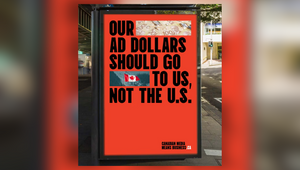
Why Lebanese People Shouldn’t Sell Their Votes for Cheap

FP7 McCann and Annahar Newspaper banded together to create a calculator that shows the people of Lebanon exactly what their vote is worth – and it’s much more than $100. Encouraging the public to put in their details and find out the cost attributed to their vote, it turns out that people are vastly underselling the opportunity to bring real change to the country.
The campaign comes after several years of hardships plaguing Lebanon, worsened by the effects of the covid-19 pandemic, Beirut port explosion, and the seemingly unrelenting economic crisis. Part of the campaign involved creating a calculator to analyse the cost of a vote, for which historians, professionals and hundreds of variables were consulted and considered. Healthcare, education, security and infrastructure were just some of the factors being considered and the numbers were far higher than you might expect. The spot comes as an effort to encourage people to know the value of their say, or sell their vote for a fair price.
FP7 McCann Dubai group creative director Hadi Abu Khuzam tells LBB’s Nisna Mahtani about the process of creating the calculator, the power of social media and putting a price on votes.
LBB> Tell us about the initial stages of this campaign. What did you set out to do?
Hadi> In Lebanon, people are used to selling their votes for as low as $100. This is especially true during these times, when the country is going through the most challenging period it has ever faced. The country is undergoing an economic collapse, unlike anything seen before. This makes Lebanese people more prone to sell their votes, as they don’t perceive that they will impact the country’s future.
Ironically, during every election period, campaigns telling people not to sell their votes spike (to no avail, of course). So, knowing this, we developed a campaign with a different approach, one that educates people about the real prices of their votes. So this time, if they choose to sell them, they’ll do it for the right price – the highest price possible.
We also strengthened the campaign with reactive automated ads that will show Lebanese people exactly how much they’re losing when they sell their vote for cheap.
These ads also helped make Lebanese people aware of how the prices of the votes changed in real-time.
LBB> How significant is the issue of vote-buying, and how has it affected Lebanon?
Hadi> Lebanese people have lost faith in the process, they feel their votes don’t really make a difference. This puts them in a position where they have to choose between not making money at all or making a quick buck by selling something they feel has no value.
Our campaign tells them that their vote is not only valuable but more expensive than they might think.
LBB> The campaign had to go live in time to be noticed before the election. How long did it take to create, and when did you begin the process?
Hadi> The campaign was conceptualised a while ago. As soon as we got the client confirmation, we rushed to put everything together to make an impact. We knew that timing was crucial, so we started airing the campaign two weeks before the elections. If we waited too long, our message was no longer relevant. We had to use the momentum of the elections to be part of the conversation. Given that an important part of our campaign had to do with being reactive and having a direct response to the price of the votes provided by the website, we had to keep on monitoring social media channels to know when to strike with the right message.
LBB> The copy is direct, and the campaign is concise being only 44 seconds long. How did you decide on the length and wording of the campaign, to ensure it was effective in delivering the message?
Hadi> Given that we were primarily on social media, we were aware of the fact that our message had to be precise, provoking, and ground-breaking to get people’s attention. It took a long time to craft each word and each phrase, to make it as powerful as possible.
LBB> How did the idea of a calculator first come into play and why was it the best approach to go with?
Hadi> It all started with a conversation about how we usually undermine the real value of a vote and how it can affect your life for years to come if you sell it or don’t use it wisely.
When you sell your vote, you are actually giving up on education, healthcare, security, stability, and even dignity.
And the question was asked: But… How much are you really giving up? Could you put a price on your vote?
That led to an hour-long discussion on how each vote is valued differently when you take into account how it can impact your life. So, we decided to create a tool that would provide people with an accurate price for their votes.
For this campaign to be relevant, the price had to be precise and personalised. That’s why just setting an average price for everyone’s vote wouldn’t cut it. The power of this campaign comes from taking into consideration the relevant criteria that make the price of each vote different.
LBB> We’d love to know more about the calculator. What was the process of creating it and how did you collect the data to determine the final numbers?
Hadi> Everyone on the team had to learn some excel, statistics, algorithms and programming. We had to go through papers, graphs, and numbers in order to produce an accurate calculation. We revised more sociological and demographic studies than we ever did during university.
Our algorithm went from a simple calculation to including dozens of variables, from education to even the current economic inflation. We also cross-checked our information, estimations, and findings with historians and professors who are in tune with the political situation in Lebanon.
We started by building a hefty database of values and prices for healthcare, education, security, and infrastructure. We then had people interact with the website.
The more people used the website, the more precise the price of our outcome became. Our algorithm would crosscheck every input with our database to produce more accurate results.
Just like an actual currency, the price of each vote would affect the calculation of the following votes. This information was later used in our automated ads to inform Lebanese people about the current value of the votes.

LBB> What has been the biggest challenge of creating this campaign?
Hadi> There was more than one challenge; first, the timing. We had to make everything as fast as we could to have it ready before the elections. Then, we had to be reactive and show people how the prices of the votes were changing through our automated ads. So, besides the usual rush that comes from deploying a campaign, we had to closely monitor what was happening in the country to be ready to react accordingly.
LBB> You’ve encouraged users to share the value of their votes on social media. Why was it important to create an online conversation?
Hadi> Usually, campaigns are unilateral, just informing the target audience about something.
We had to engage with them to really break the boundaries and get people’s attention as we did. So for us, having this conversation with our target audience was key. Also, in this particular campaign, the more people interacted with it, the more politicians knew they couldn’t buy votes for cheap anymore.
LBB> What has the reaction to the campaign been like so far? Has it encouraged people to reconsider the value of their votes?
Hadi> First, the acceptance of the campaign has been beyond our expectations. People have not only engaged with it, but they’ve also used it to show their concern about the country and its situation. Thousands of people have used the website, and more importantly, it has been used as a way to bring awareness to a latent problem in the country.
LBB> Is there anything else you would like to share with us?
Hadi> Yes, in every country, votes are valuable. They are an expression of freedom of speech and choice that we usually take for granted. They hold the only true power citizens have in society. It’s easy to see them as insignificant because a vote is just one among millions. But it’s the collective power that can make a difference. Voting is an act of sovereignty, it’s one of the fundamental pillars of any democracy. When you sell your vote, you’re also selling your liberty and giving away your chance to be part of your country’s future.
The ideal outcome of this campaign is not to sell votes, but to inform people of how valuable their votes are.
Visit se3erlsot.com and know the real price of your vote. Don’t sell it for cheap!
Also, thanks to everyone who made this campaign possible.















